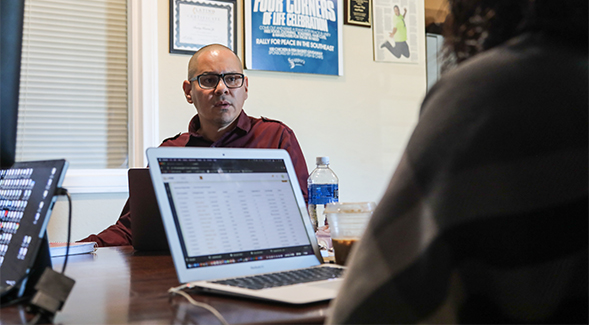SDSU Professor Empowers Community Mentors to Transform Lives
Given the impact mentors have had throughout his life, education professor Jose Estrada works to strengthen grassroots networks in vulnerable communities.

A mentor once told Joey Nuñez Estrada something the education professor never forgot: If you transform the lives of 10 people, you transform the lives of thousands.
This wisdom has guided much of Estrada’s career, from the time he was a child services social worker in Los Angeles to today, where he heads San Diego State University’s College of Education School Counseling program. Estrada is project director of a $4.5 million, three-year grant from the U.S Department of Labor assisting grassroots nonprofits that help the formerly incarcerated gain education and skills needed for re-entry into the job market.
He’s also seen it play out in his own life.
Estrada grew up in Pacoima, a northeast Los Angeles neighborhood he describes as rife with crime, gangs and drugs. Whereas many of his friends never left the area, Estrada credits mentors and advocates — people like his mother, supportive neighbors and coaches — with encouraging him to focus on football, eventually go to college and become an accomplished scholar.
“I wasn’t aware of all the saviors, community mentors and people who had an impact on my life at the time, because I was just a kid growing up on the block,” Estrada said.
“Even now, I dissect why I made it out of the neighborhood, and why other kids did not,” he continued. “That’s become my research focus — connecting and supporting the street soldiers who saved my life — because I want everyone to have hopeful opportunities.”
Estrada is the inaugural lecturer for SDSU’s new Innovation and Excellence Seminar Series, which highlights distinct research and scholarship that embodies the university’s commitment to inclusive excellence.
SDSU’s new Center for Inclusive Excellence, which houses programs that advance equity, diversity and inclusion at the university, will host the lecture, scheduled for 12:30 p.m. on Thursday, Feb. 20, in Professional Studies and Fine Arts 100.
Mentorship and support
Estrada’s work focuses on how to encourage grassroots mentorship in communities struggling with violence, crime and incarceration. He has authored several book chapters and scholarly articles on systemic factors that influence school and community violence.
Estrada considers ways to empower and support individuals who have navigated the criminal justice system, struggled with addiction or survived violence to become community leaders and mentors who are trained in specialties like trauma-informed care and restorative practices. These people can often engage and motivate youth in ways other system stakeholders cannot, Estrada said.
“I see myself as a translator, a connector,” he said. “I try my best to infuse and overlap the collective wisdom and knowledge of the streets and academic spaces. Sometimes in my classes I’ll bring people from the community to dialogue with the academic world, because it provides a different and important perspective.”
As California Director for the Latino Coalition for Community Leadership, Estrada directs federal funding to grassroots organizations, helping them build capacity and, over time, become self-sufficient through other sources of funding. He and his collaborators train staff in areas like case management, motivational interviewing, fiscal management and data reporting.
Reggie Washington says Estrada has been critical in helping him develop his San Diego organization, Project A.W.A.R.E.
Washington started the organization when he was incarcerated, realizing that vulnerable youth needed some of the life skills lessons — in topics like anger management and emotional literacy — he was receiving in prison classes.
Forging connections
Shortly after Washington was released, he began working with Estrada to improve and grow his organization. Estrada connected him with training, and Washington became a certified community mentor and International Institute of Restorative Practices instructor. Estrada also connected Washington with county officials, eventually facilitating partnerships with the San Diego County Probation Department and other government agencies and local nonprofits, where Washington now teaches staff about restorative practices.
“He’s been able to understand that all education doesn't have to come from books, that individuals who have experienced certain things have value,” Washington said. “He’s a connector. He’s able to get us into institutions where I personally might not be able to get into otherwise, and he builds bridges.”
Estrada’s skills as a bridge-builder have helped transform Project A.W.A.R.E, along with countless other nonprofits. And as Estrada’s mentor told him many years ago, the ripple effect is endless.



